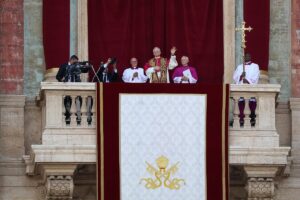
A New Pope, A New Dawn
Personal reflections on the papacy, an American pontiff, and hope that faith and leadership may yet shape our fractured world.
By Willemien Otten, Professor at the University of Chicago Divinity School. With an Introduction by Andreas Telser.

The Zero Theorem – “Zero must equal 100%”[1]. AI, Totalitarianism, and The Voluntary Path to Self-Enslavement: A Theological Perspective
The question of what philosophy and theology have to contribute to the development of AI has been a matter of scholarly debates. While AI entered common human lives almost abruptly and immediately, human adaptability proved impeccable: AI became a part of life as another commodity. In her contribution, Milja Radovic explores the possible downsides of AI from a theological point of view and asks the question: Is AI really for the benefit of humanity?

The Small Stone in the Shoe. When Obsession Meets Grace: The Ambiguities of Scrupulosity – A Review of „Can Scrupulosity Be Spiritually Innocent?“
In her article, Veronika Hübner reflects on a recent lecture by Tasia Scrutton at the European Academy of Religion, exploring the ambiguities of Scrupulosity—a religiously infused obsessive-compulsive condition that can deeply disrupt faith while occasionally fostering spiritual depth.

Wenn Bildung nur noch einen Marktwert behält. Die marktwirtschaftliche Ausrichtung von katholischen Hochschulen in den USA und die weitreichende Gefahr eines Ausverkaufs von katholischer Bildungstradition
Zum Problem werden Werte, wenn sie sich nicht mehr an den zugrundeliegenden Erfahrungen orientieren, sondern der kapitalistische Markt zum entscheidenden Faktor wird und darüber bestimmt, ob diese Werte von Relevanz sind und wie ihr Marktwert ausfällt. Diesem Problem geht Massimo Faggioli in seinem neuesten Buch – „Theology and Catholic Higher Education. Beyond Our Identity Crisis, Maryknoll 2024“ – nach, in dem er den gegenwärtigen Status der katholischen Bildungstradition in den USA untersucht. Eine Analyse von Florian Klug.

Der nächste Papst
Mit dem Tod von Papst Franziskus haben die Spekulationen über mögliche Nachfolger in den internationalen und nationalen Medien begonnen. Versucht man sich in Prognosen über potenzielle Nachfolgekandidaten des verstorbenen Papstes liegt die Aufgabe erstens darin, auf die Situation der Katholischen Kirche und die daraus sich ergebenden Diskurse über den Weg, den die Kardinäle beschreiten wollen, zu achten. Eine Analyse von Kurt Appel

Und jetzt? Der neue Papst vor dem Großinquisitor
„Die Wahl wird zwischen Betäubung und Prophezeiung liegen. Der göttliche Name, von dem uns die Zehn Worte gebieten, ihn nicht vergeblich zu benutzen, ist in den Mund der großen Verderbten zurückgekehrt….“ Ein kritischer Kommentar von Sergio Massironi. anlässlich der bevorstehenden Wahl des neuen Papstes.

The Religious Topography of Yogyakarta (1/2)
Im ersten Teil seines Beitrags beschäftigt sich Rüdiger Lohlker mit der Verbindung von religiösen Praktiken und räumlichen Gegebenheiten in der Region Yogyakarta. Die Tempel Prambanan und Borobudur stehen dabei im Mittelpunkt: Während Prambanan als Zentrum der Shiva-Verehrung gilt, ist Borobudur ein bedeutender buddhistischer Pilgerort. Beide Stätten werden zudem von indonesischen Muslimen als Orte spiritueller Kraft wahrgenommen. Über diese Tempelanlagen hinaus bildet die kosmologische Achse Yogyakartas eine zentrale spirituelle Struktur, die in das Selbstverständnis des Sultans und islamische Traditionen eingebettet ist.

Die Gemeinsame Feststellung von Porvoo: Eine Transformation der besonderen Art (3/3)
Der dritte Teil des Blogbeitrags von Vera M. Waschbüsch diskutiert die PGF als mögliche Antwort auf aktuelle ökumenische Herausforderungen. Dabei wird besonders das Verständnis des Bischofsamts und der historischen Sukzession zwischen anglikanischen und lutherischen Kirchen analysiert, das sowohl theologische als auch politische Dimensionen hat. Trotz der erreichten Kirchengemeinschaft bleibt die in Joh 17,21f formulierte Einheit ein fernes Ziel, da grundlegende Unterschiede im Amts- und Kirchenverständnis weiterhin bestehen.

Die Gemeinsame Feststellung von Porvoo: Eine Transformation der besonderen Art (2/3)
Der zweite Teil des Blogbeitrags von Vera M. Waschbüsch untersucht die Rezeption der Porvoo-Gemeinsamen Feststellung im deutschsprachigen Raum. Er zeigt, dass die PGF dort kaum Beachtung findet, was unter anderem an theologischen Differenzen, insbesondere zur Frauenordination und dem Bischofsamt, liegt. Zudem wird deutlich, dass auch ökumenische Institute nur vereinzelt zur PGF Stellung nehmen, was die Wahrnehmung und Relevanz der Erklärung weiter einschränkt.

Die Gemeinsame Feststellung von Porvoo: Eine Transformation der besonderen Art (1/3)
Vera M. Waschbüsch untersucht in diesem ersten Teil ihres dreiteiligen Blogbeitrags die Porvoo-Gemeinsame-Feststellung (PGF) im ökumenischen Kontext und ihre Bedeutung für den europäischen Protestantismus. Sie beleuchtet die historischen und theologischen Hintergründe dieses Zusammenschlusses zwischen lutherischen und anglikanischen Kirchen in Nordeuropa und diskutiert dessen ökumenische Reichweite. Dabei werden sowohl bestehende Herausforderungen als auch die kulturhistorischen Bedingungen analysiert, die diesen kirchlichen Annäherungsprozess ermöglicht haben.